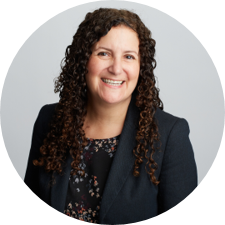[Set Slide Image]
PD Pathways
PD Pathways is a monthly digital newsletter for CPAs and business professionals, showcasing the latest news and resources in CPABC Professional Development.

Insights in Working with Indigenous Businesses
By Vickie Whitehead, CPA, CGA, CAFM
Working with Indigenous businesses is becoming more common for companies in BC that may want to:
- Increase their diversity by hiring more Indigenous people;
- Engage in real economic partnerships, joint ventures and/or ownership opportunities; and/or
- Increase Indigenous procurement in their supply chain.
Here’s my personal experience working as a Cree Métis accountant, along with some ways that you can start working with Indigenous businesses.
Definitions Indigenous: Refers to Métis, First Nation, and Inuit peoples. First Nation: Refers to a band of Indians as defined in the Indian Act. There are over 630 First Nations in Canada, 203 in BC alone. |
In the 1990s, I worked at the federal government, at what was then called Indian and Northern Affairs Canada. I was in my second year of obtaining my accounting designation and I was hired to review the audited financial statements of one-third of the First Nations in BC. I travelled to communities when there were financial difficulties identified in their audit, to work with the First Nation on creating their five-year financial plan.
Each time I visited a First Nation, I heard their story and learned about their history, their needs, and the wrongdoings of prior and existing governments. I was well-trained, well-educated, understood the government processes, and was Indigenous myself, but I learned there was a real gap between what I thought I knew, what I thought they needed, and what they actually needed to achieve financial sustainability.
There have been some positive changes since then, mostly as a result of First Nations in BC that legally fought and won court cases regarding Indigenous rights, Indigenous title, and treaty rights, as well as human rights. Many non-profit organizations have formed, including AFOA BC and the FNFMB, who worked with the Federal government to make needed changes to various financial legislation.
These have led to changes in business arrangements between the profit sector and Indigenous communities. For example, impact benefit agreements between industry and Indigenous groups that charge fees for land use are evolving into true partnerships and Indigenous ownership. Some First Nations see economic prosperity as a way to exercise financial sovereignty and a means to close the socio-economic gap that may exist for their members. Accordingly, over the past 25 years, Indigenous entrepreneurship has increased exponentially for First Nation owned corporations, social enterprises, and Indigenous individuals.
With this in mind, here are some ways that you can prepare your company to work with Indigenous businesses:
Truth and reconciliation
As a business in Canada, reconciliation should be on your agenda, as well as how it could be reflected in your corporate culture. A starting point is to enact Call To Action 92 (Business and Reconciliation) from the Truth and Reconciliation Commission of Canada. This call to action is to “commit to meaningful consultation, building respectful relationships, and obtaining the free, prior, and informed consent of Indigenous peoples before proceeding with economic development projects.”
Further demonstrating that reconciliation is a business responsibility, questions such as, “How are you enacting reconciliation in your company?” are beginning to show up on requests for proposals and interviews. If reconciliation is done correctly, it can engage staff and management in important conversations on the history of Indigenous peoples.
Define your value
Here are some questions that your organization can ask to define your value proposition to Indigenous businesses:
- What are you bringing that is of value to the Indigenous business?
- Is it of value now or in the future?
- What other value can you add?
Some newer or growing Indigenous businesses may need support for business management, or could benefit from mentoring, while others are well established and do not require those supports. Before offering support, familiarize yourself with the business and their needs through your discussions first, to determine if these supports are appropriate or required – if they aren’t, your offer might be perceived as paternalistic.
Do your research
Before reaching out to an Indigenous business, get to know them. For example, a First Nation corporation can have a CEO, CFO, board of directors, and report to a Chief and Council who act on behalf of their membership. Some First Nations businesses are run out of a First Nation administration office. There are many variations in this structure based on what works for a specific First Nation. Learn about the business through their website, Indigenous Services Canada, and other sources. An Indigenous businesses owned by an individual may have a separate office, they may work from home, or may not be affiliated with their First Nation.
It may take some time
Some companies go wrong in thinking that because they have worked with one First Nation, they understand them all. This is not the case – there is variation in values, experience, administration, availability, and goals and objectives, and these variations show up in business decisions.
In the case of a First Nation corporation, depending on if the work is done on-reserve or in their traditional territory, others may need to be consulted and provincial rules may not apply. Other factors that may affect your business relationship are: taxation, location (on-reserve or off-reserve), upcoming elections, land designations, and/or environmental acts, all of which take time and effort to understand.
These are just a few ways to start thinking about working with an Indigenous business. Approaching this relationship from the perspective of learning, listening, and understanding first will go a long way in helping you reach your goals.
 Vickie Whitehead, CPA, CGA, CAFM is the Director of Indigenous Services at Crowe MacKay LLP. Based on her 22 years of industry and government of Canada experience, Vickie works with her indigenous clients to help them achieve success in their sovereignty goals, specifically in the areas of indigenous Trust creation and management, board governance, and financial management.
Vickie Whitehead, CPA, CGA, CAFM is the Director of Indigenous Services at Crowe MacKay LLP. Based on her 22 years of industry and government of Canada experience, Vickie works with her indigenous clients to help them achieve success in their sovereignty goals, specifically in the areas of indigenous Trust creation and management, board governance, and financial management.
The majority of her early career was at the Department of Indigenous Services Canada (DISC) in the British Columbia and National offices in various financial and management related roles for over 17 years. In the past seven years she has specialized in indigenous trust administration, trust structuring, indigenous governance and program, financial advisory, and policy development.
Attend PD Nexus: Business & Leadership Insights on July 7, and select the session on Developing Indigenous Business Relationships to hear Vickie and other panel members discuss perspectives on how to partner with and support indigenous businesses.

Strategic Management Certificate Program
The four-course Strategic Management Certificate Program focuses specifically on the critical components of leadership and strategy, and is most valuable for mid-managers and those transitioning to senior management or executive roles who will need to make sound business decisions.
Strategic Planning
This interactive session will use case examples to examine the link between stated organizational goals, the business environment and visible strategies, with focus on the functional strategy level.
Read more on Strategic Planning
Risk Management and Governance
This interactive session will examine different types of risks which can undermine the achievement of an organization’s objectives, and the management approaches and tools used to manage them.
Read more on Risk Management and Governance
Change Management
This interactive session will focus on how organizations can improve the odds and how your leadership can support successful change in a world where change is an imperative.
Read more on Change Management
Team Development
This interactive session will provide participants with an in-depth understanding of factors impacting team effectiveness, including team design, stages of team development, and ingredients necessary for achieving results.
Read more on Team Development
Looking for courses in Taxation?
We have a number of courses in Tax coming up in June and early July.
Corporate Restructuring - Application for Private Corporations
This seminar provides a practical approach and guidance on identifying, planning, documenting, and implementing reorganizations of private corporate groups.
Read more on Corporate Restructuring - Application for Private Corporations
Corporate Tax - RDTOH, CDA and Other Tax Accounts
This seminar provides a detailed review of the key tax accounts for private corporations and examines tax planning processes in the case of multiple tax accounts.
Read more on Corporate Tax - RDTOH, CDA and Other Tax Accounts
Corporate Tax - Review of Tax Planning
This two-day seminar in corporate tax is designed for those who desire to update and refresh their knowledge in both technical and tax planning issues for corporations.
Read more on Corporate Tax - Review of Tax Planning
Corporate Tax - Small Business Deduction and Private Corporate Groups
While the small business deduction reduces the amount of income tax for many corporations, the myriad of rules and regulations and recent changes has significantly expanded the complexity.
Read more on Corporate Tax - Small Business Deduction and Private Corporate Groups
Income Tax - Real Estate
This seminar identifies and reviews significant income taxation issues arising from various aspects of real estate activities and includes practical, business-focused suggestions for dealing with such issues.
Read more on Income Tax - Real Estate
Life-Interest Trusts as Will Substitutes: The Use and Taxation of Alter Ego Trusts and Joint Spousal or Common-Law Partner Trusts
This half-day seminar focuses on why and how joint spousal or common-law partner trusts and alter ego trust are commonly used as will substitutes in British Columbia.
Read more on Life-Interest Trusts as Will Substitutes
Taxation - Registered Charities and NFPOs
This seminar provides a detailed technical review of the numerous income tax issues faced by registered charities and NFPOs, including real-world examples and case studies to provide participants with practical and useful takeaways.
Read more on Taxation - Registered Charities and NFPOs
US Corporate Tax – Fundamentals
This course covers relevant knowledge about common questions from Canadian entrepreneurs expanding their businesses into the United States.
Read more on US Corporate Tax – Fundamentals
In-Person Controller’s Executive Programs
Our popular Controller’s Operational Skills Program and Controller’s Management Program will be offered in-person this fall for the first time since 2019! If you prefer the face-to-face interaction for these executive programs, make sure to register early.
Controller's Operational Skills
The Controller’s Operational Skills Program is designed to enhance your role on the management team by sharpening your skills in risk management and controls, ethical leadership, planning, budgeting and forecasting, performance measurement approaches and financial reporting.
Victoria | Sep 21-24
Read more on Controller's Operational Skills
Controller's Management Program
The Controller’s Management Program is designed to provide you with the theory, best practices, tools, and skills to further sharpen your leadership and management skills.
Vancouver | Sep 25-28
Read more on Controller’s Management Program
In-Person Seminars
Looking forward to attend face-to-face PD seminars again? We are excited to offer these titles scheduled over the next few weeks.
Critical Thinking and Self Reflection
This one-day course identifies the link between learning styles, critical thinking and self-reflection in our working and personal lives and how to use these to enhance personal effectiveness.
Read more on Critical Thinking and Self Reflection
Compilation Engagements - Application of the New CSRS 4200
This seminar will include hands on opportunities to review application of standard to different scenarios, comparison with previous standard and with other non-assurance standards.
Read more on Compilation Engagements - Application of the New CSRS 4200
A Threats and Safeguards Approach to Ethical Decision Making
In this workshop, we’ll explore situations in our professional roles that involve ethical challenges and examine how these can pose threats to our compliance with the Fundamental Principles.
Read more on A Threats and Safeguards Approach to Ethical Decision Making
Review Engagements - Application of the Standard
Using extracts of a review engagement file for a fictitious entity, this training activity allows participants to deepen their knowledge of the requirements and to benefit from practical advice in order to properly apply them.
Read more on Review Engagements - Application of the Standard
Corporate Tax - Investment Holding Companies
The taxation of investment holding corporations have seen a number of significant changes over the past few years. This course will review these and other changes using a number of examples, as well as examine the issue that is now faced by many clients – should I keep or wind up my investment corporation?
Read more on Corporate Tax - Investment Holding Companies
Excel: The Next Level of Skills
It is time to take your Excel skills to the next level! Discover the best features and functions in Excel to make your accounting and finance tasks easier, faster and more accurate.
Read more on Excel: The Next Level of Skills

Building Your Blocks: Stack up Your Skills to Become a Better Finance Manager
You’re likely keenly aware of this, but being an effective and sought-after finance manager requires a unique set of skills. In a role that is key to the success of any organization, the individual needs to possess a blend of specialized knowledge in accounting as well as aspects of managerial and leadership skills that go beyond a strong grasp of numbers. Are you a new finance manager, or aspiring to move into that position? Then you might want to consider refining some of these skills.
Analytical Skills – you’ve crunched the numbers, what’s next?
It’s fairly simple to collect a mass pile of information to create impressive looking spreadsheets, but are you effectively, efficiently and thoroughly analyzing all that information to produce useful insights? Honing your analytical skills – your ability to interpret data accurately, detect patterns, and make dependable decisions based on these strong observations – is a crucial step that will enable you to add value to your organization.
Here are some seminars that will help you hone those analytical skills:
Budgeting & Financial Management: Understanding Budgeting Variance Analysis & Forecasting; Budgeting and Forecasting Tools and Techniques; Creating Value Through Budgeting; Financial Analysis Fundamentals
Risk Management – the lower the risk, the higher the reward
There’s no way to completely eliminate all risks to an organization. But part of a modern finance manager’s role is to be aware of potential risks and then minimize the possible fallouts resulting from these risks. As new technology and shifting work trends proliferate the employment landscape, CFOs are increasingly required to take on a more strategic role in risk management. This results in a cascading requirement on their finance managers to do the same.
Be confident in your risk management fundamentals and stay on top of new potential threats:
A Risky Business: Risk Management Tools for Professionals; Enterprise Risk Management Fundamentals; Fraud Happens – What to do When You Suspect Fraud; Fraud in the Workplace; 5 Ways COVID-19 Will Forever Change Our Risk Thinking
Creative Thinking and Innovation – repetition is not always your friend
As accountants, repetitive tasks and procedures are sometimes just part of the job. And while fixed processes are naturally necessary in the accounting space, hesitancy to explore new ideas can create barriers to problem solving. But keep in mind that the world has advanced rapidly over the last few years - being open to how evolving technologies and thought processes can transform the finance function will present new opportunities for you and your organization. By creating a culture of innovation, you can also keep your team ahead of the curve – while your organization may not necessarily be adopting AI, machine learning, big data, or cloud based solutions tomorrow, an open and creative culture will increase the likelihood of such transitions being embraced, properly prepared for, and successfully deployed in the future.
Discover how creative thinking works: Creative Leadership: Bringing Innovation to the Workplace; The Strategic Finance Department: 15 New Roles; Thinking for a Change: Preparing Your Mind and Brain for Disruption; Fostering Innovation and Entrepreneurial Thinking; MBAexpress: Creativity and Innovation; Bring Innovation To Life In Your Business
Communication & Interpersonal Skills – it’s not just all talk
Your role as a finance manager will often require you to communicate tasks and build relationships with a team – bad communication and presentation will almost always lead to misunderstandings and time-wasters, while good communication will often produce a well-oiled team that performs collaboratively and efficiently. Similarly, your ability to handle challenging interpersonal situations positively will go a long way towards ensuring that your team functions smoothly. Communication skills are also essential in conducting favourable negotiations and delivering impactful presentations.
Here are some ways to improve your communication and interpersonal skills: Communicating With Influence; Communicating Effectively Under Pressure; Level Up: Public Speaking and Presentation Skills; Level Up: Writing for Clarity and Impact; Tools for Communicating with Difficult People; Becoming a Skilled Negotiator; Presentation Skills for Finance Professionals and Executives that Make an Impact
Leadership & Teamwork – put together a good team and then trust them
Transitioning from your role as a professional expert to actually leading a team can be a serious challenge. Many of us are at least aware of the basic traits of effective leaders, but we don’t always know the why’s, when’s, and how’s. Becoming a truly effective leader starts from understanding yourself and your leadership style, then building upon your leadership capabilities from there. Discover what true delegation and empowerment look like, explore how to become a more inspirational leader capable of coaching and mentoring others to fulfil their potential, and learn about elements of good versus bad feedback to elevate performance management. Consider how to get the best out of your team by building a leadership brand. You can also listen to our recent episode of Coffee Chats with CPABC as Laura Villacrusis, senior consultant with Kwela Leadership, discusses what makes a high performing team member.
Explore these topics to help you build your leadership repertoire: Building Your Leadership Brand; Building High Performance Teams; Employee Delegation, Engagement, and Empowerment; Leadership and Coaching; Leading Professional Teams - Successfully Transitioning from Professional Expert to Team Leader; Performance Management in Challenging Times; Hire the Best, Keep Them and Fire the Worst

A Passion for Sharing her Considerable Accounting Knowledge
Diane E. McDonald, CPA, CA, brings over 35 years of experience as a practitioner in public practice in developing and providing professional development training for preparers of financial statements, their auditors and accountants.

Today, Diane provides consulting and professional practice services throughout B.C. Diane works with companies and practitioners navigating Canadian and SEC financial reporting obligations and provides accounting and financial reporting consultation services on the application of IFRS, ASPE, ASNFPO and U.S. GAAP. Diane also works with practitioners performing audits and review engagements, assisting them with the design and application of assurance standards.
See what past attendees say about their seminar experience with Diane:
“Excellent speaker. Covered all the materials during the lecture and provided the most relevant details of each Module. Excellent!”
“Diane is a very good instructor. Knows her information. I like that she can give practical real-world examples and deal with participant's real-world questions.”
“Diane was great. She had relevant and practical examples. She kept me engaged all day. She knew her stuff and was able to make it easy to understand.”
“Clear, knowledgeable, repeats important information effectively to enhance retention.”
Learn from Diane at the upcoming live webinars on ASPE - Disclosure and Presentation, ASPE - Review of the Standards, Audit Engagements – Auditing Accounting Estimates (CAS 540) Revised Standard, IFRS 15 - Revenue Recognition, IFRS 9 - Financial Instruments and in person sessions in Vancouver on Compilation Engagements - Application of the New CSRS 4200 and Review Engagements - Application of the Standard.

Free Webinar - An Overview of the Resilient Leadership Certificate Program
As a leader, do you have what you need now to encourage, inspire and support people to “show up”, bring their effort and energy to their work, and sustain optimism for the long haul?
This webinar is a brief introduction to the Resilient Leadership Certificate Series. You will get some new ideas and insights from each of the 5 seminars and a peek into the full content and value of the Resilient Leadership Certificate.

PD Pathways
Reminder
Your 2021-22 PD Passport Expires August 31!
Any unused portions of the PD Passport(s) after August 31 cannot be refunded or credited for PD seminars or products.
Apply your remaining credits and register early for seminars that interests you.
To view your outstanding passport credits, login to your member profile in Online Services, click on the “Professional Development tab", and select “View Passport Statement” from the menu on the right.
Did You Know?
You can use your PD Passport credits to register for our PD Nexus Days.
With plenaries and three streams of break-out sessions to choose from, our virtual PD Nexus Days are a great way to expand your knowledge, sharpen your skills and customize your day of learning that is relevant to you.


.png)
